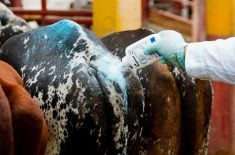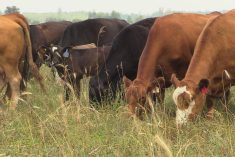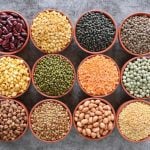“Working-level” talks are reportedly underway to set up negotiations between Ottawa and Seoul to resume Canadian beef exports to South Korea.
Korean news agency Yonhap reported Wednesday that Canada is asking for “unfettered access” to South Korea’s beef market after Seoul agreed last week to loosen its ban on U.S. beef imports.
The report quoted Korea’s agriculture ministry as saying talks are underway to set a time and place for negotiations.
The Korean government, which is working with Washington on a bilateral free trade deal now before the U.S. Congress, announced April 18 it will gradually expand its imports of U.S. beef beyond the boneless beef currently allowed.
Read Also

U.S. livestock: Cattle regain ground, hogs dip
Chicago cattle futures regained ground on Wednesday after falling off a cliff late last week. Most-active December live cattle contracts…
Bone-in beef from U.S. cattle under the age of 30 months (UTMs) is expected to be admitted first, starting next month, to be followed later by beef from older cattle.
According to USDA, the Korean market for U.S. beef was worth US$815 million in 2002, the year before Seoul shut its doors to U.S. beef in late 2003, following that country’s first case of BSE.
Once the Korea-U.S. free trade deal is ratified and in place, and Korea’s current 40 per cent tariff on U.S. beef is lifted, the U.S. could potentially increase its beef exports to US$1.8 billion, U.S. Agriculture Secretary Ed Schafer said April 18.
“South Korea has raised the bar for other Asian nations, such as Japan, Taiwan and China, and the U.S. will continue to press for full market access throughout the rest of the Pacific Rim so that unreasonable restrictions on U.S. beef and beef products are fully removed,” Schafer said in a release.
Seoul — which has been negotiating toward a bilateral free trade agreement with Canada since 2004, most recently at a meeting last month in Ottawa — has banned all Canadian beef and live cattle since May 2003, following the discovery of Canada’s first case of BSE in an older Alberta cow.
In 2002, the year before BSE was found in Canada, Korea was the fourth largest export market for Canadian beef, estimated at about C$50 million.
Yonhap, in its article Wednesday, cited unnamed experts as saying Seoul will probably have to accommodate Canadian beef, since Canada and the U.S. share the same “risk controlled” status for safeguards against BSE, as approved by the World Organization for Animal Health (OIE). Safeguards include the removal of specified risk materials (SRMs), the tissues known to harbour the protein that causes BSE in infected animals.
U.S. feed ban
The U.S. — which has banned the feeding of ruminant tissues to other ruminants since 1997 — on Wednesday announced it would block the use of cattle SRMs in all other animal feeds as well.
That move is intended to avoid the possibility of BSE cross-contamination of feed intended for cattle, either through misfeeding on-farm or through contamination when feed is manufactured or shipped.
The new U.S. rule is to take effect in April 2009. Canada, in July 2007, tightened its own 1997 ruminant-to-ruminant feed ban to block the use of ruminant SRMs in any animal feed, pet food or fertilizers.















